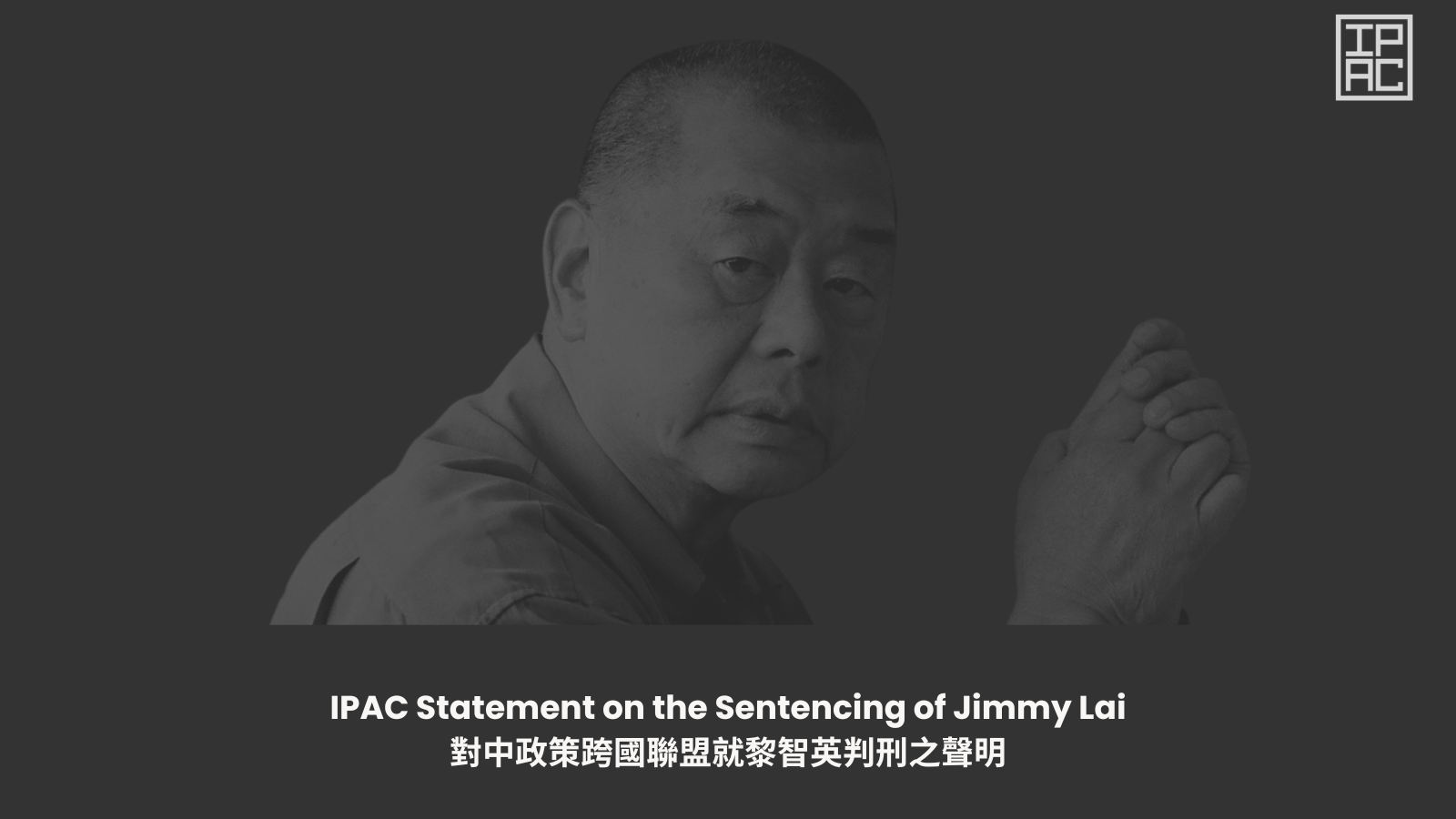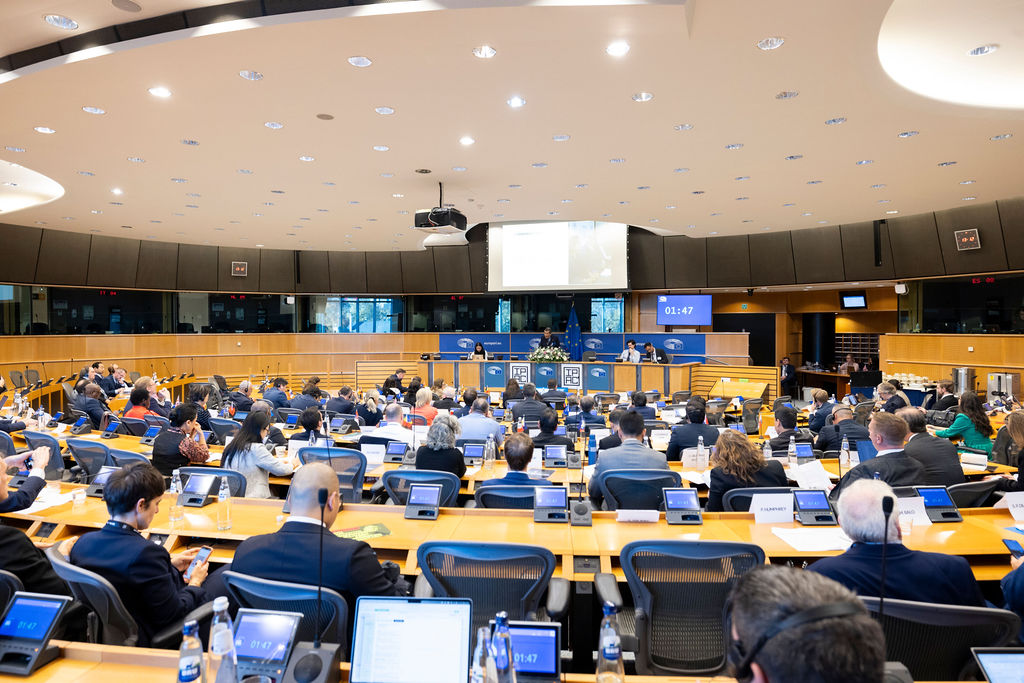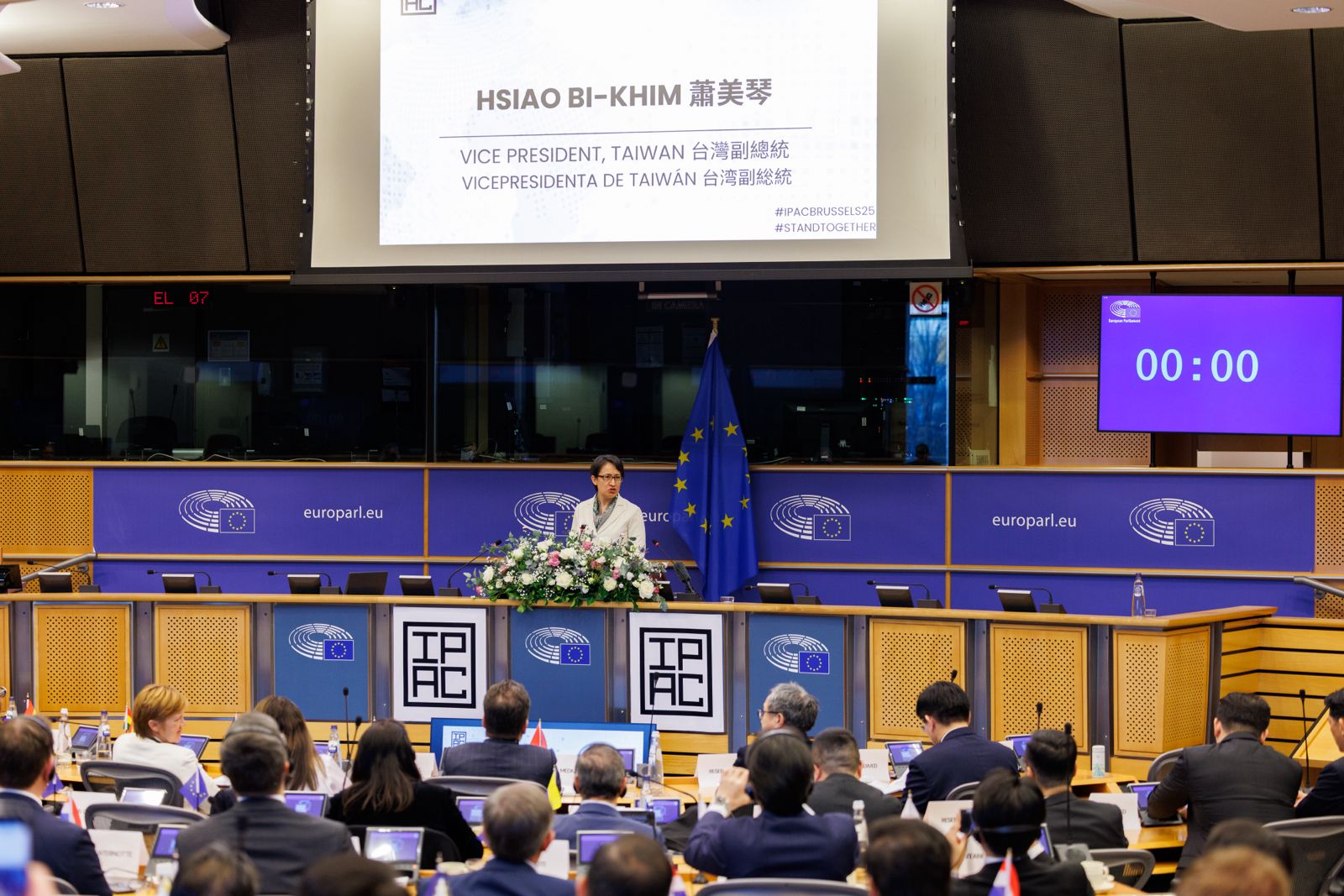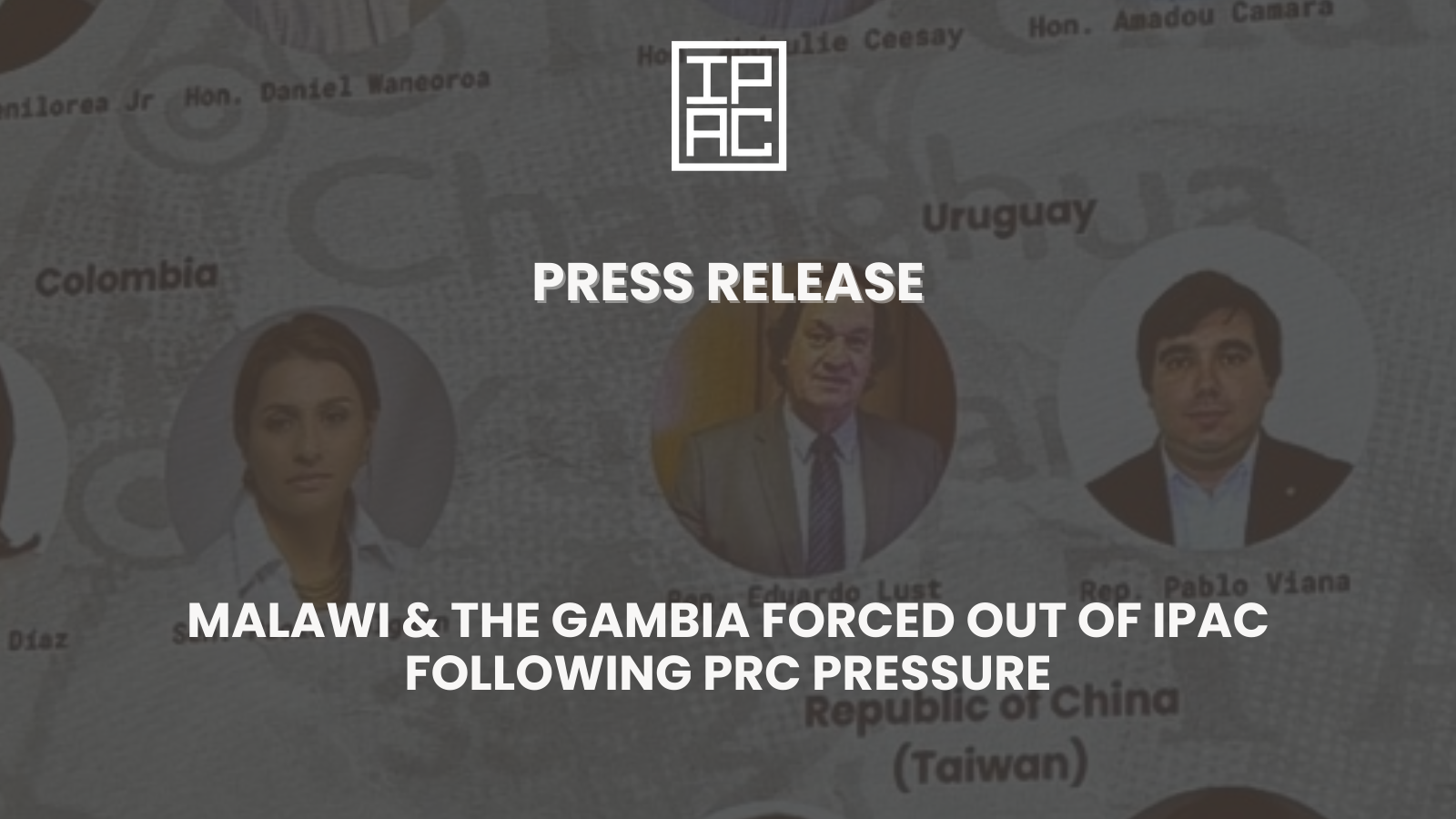IPAC DC Summit Communique: ‘Campaigning blueprint’ to confront Beijing

PRESS RELEASE FOR IMMEDIATE RELEASE
ALLIANCE OF LEGISLATORS FROM 30 COUNTRIES AGREES ‘CAMPAIGNING BLUEPRINT’ TO CONFRONT BEIJING
At 2pm EST on 14th September the Inter-Parliamentary Alliance on China (IPAC) adopted a communique setting out a plan of action to address the behavior of the government of the People’s Republic of China (PRC).
The communique addresses different areas of policy relating to the PRC, calling for greater support for Taiwan and moving critical supply chains away from the PRC. The communique was adopted unanimously at the conclusion of IPAC’s largest conference to date, with over 60 legislators attending from 30 countries.
Split into sections addressing human rights, safeguarding the international rules based order, Hong Kong, Taiwan, strengthening democracy, and support for Ukraine, the document seeks to provide a high-level blueprint for parliamentary campaigning worldwide.
Senator James Paterson, IPAC Co-Chair for Australia said:
“This document sets out a clear pathway to help democracies resist coercion and intimidation from Beijing. Only by acting together can we hope to preserve and maintain the values we hold so dear, and which were paid for by the sacrifices of previous generations. We leave the summit stronger than ever, determined to continue and deepen collaboration within this extraordinary network, and determined to implement this important communique in each of our countries.”
IPAC COMMUNIQUE
WASHINGTON D.C., SEPTEMBER 2022
1. The Inter-Parliamentary Alliance on China (IPAC) was founded in June 2020 to promote reform of the approach of democracies towards the People’s Republic of China (PRC).
2. In the last two years, the concerns which gave rise to the formation of IPAC have only grown. The PRC Government continues its flagrant disregard for human rights at home, and is ever more assertive abroad.
3. Since its foundation, IPAC has sought to sensitise democratic governments to the challenges posed by the rise of the PRC, and to suggest tools to safeguard the rules and rights upon which global peace and prosperity depend, and to which we believe the PRC under Xi Jinping and the Chinese Communist Party poses a threat which must be constrained.
4. Now, after two years of campaigning and considerable growth of the network, the 30 legislatures of IPAC are united in pursuing the following plan to safeguard democracy and defend universal rights.
Upholding human rights
5. The already abysmal human rights record of the PRC government is deteriorating further still. The PRC government continues to deny its citizens freedom of expression, thought, conscience and religion, while practising mass surveillance, arbitrary detention and enforced disappearances against opponents to its rule. We highlight in particular the industrial scale human rights abuses taking place in the Uyghur Region, where a growing body of legal opinion finds credible evidence for mass atrocity crimes, alongside
ongoing abuses in Tibet and the dismantling of Hong Kong’s rights and freedoms.
6. The PRC government actively opposes scrutiny of these abuses through the UN Human Rights Council and other mechanisms. IPAC notes with concern that the UN High Commissioner on Human Rights Michelle Bachelet failed to obtain the access to the Uyghur Region needed to investigate alleged atrocities. No country can be allowed to violate human rights with impunity. IPAC will continue to call for our governments to act to hold the PRC government to account for its abuses, including:
● Updating legislation and strengthening enforcement mechanisms to detect and exclude products made with Uyghur forced labour from our supply chains, including through the use of mandatory human rights due diligence frameworks, import bans and entity blacklists;
● Adopting Magnitsky-style sanctions instruments targeting perpetrators of human rights abuses and corruption with asset freezes and travel bans, and advocating for their use against PRC officials and entities responsible for those abuse;
● Supporting independent and impartial investigations into alleged atrocity crimes in the Uyghur Region, both through the United Nations and other multilateral initiatives;
● Scrutinising and limiting exports and technology transfer of specific sensitive equipment and technologies to the PRC, in particular, where there are grounds to suspect undesirable use relating to internal repression, the interception of communications or surveillance.
● Creating a list of entities identified as complicit in the PRC government’s perpetration of gross human rights abuses in the PRC, with firms banned from investing in or trading with such entities.
Safeguarding the international rules based order
7. In recent years the PRC has sought to use its economic influence to coerce other states into acquiescence. As recent disputes with several nations have shown; the PRC practises formal and informal trade bans, popular boycotts and other coercive trade techniques to achieve its political aims. Similarly, the PRC has used its Belt and Road Initiative to exert leverage over indebted nations like Sri Lanka and Malaysia, and to secure political support within
multilateral institutions. Such coercive diplomacy is unacceptable and has no place in a rules based international order based upon reciprocity and mutual respect.
8. Only by standing together will democratic countries be able to constrain the PRC’s attempts to rewrite the norms and values of international diplomacy. IPAC calls on democratic governments to act to reduce their vulnerability to the PRC’s coercive diplomacy, by:
● Reducing strategic dependency on the PRC through building diverse and resilient supply chains. Democratic states must audit and reduce dependency on the PRC in strategically important areas, especially renewables, rare earths and medical supplies.
● Scrutinising and limiting exports and technology transfer of specific sensitive equipment and technologies to the PRC, in particular, where there are grounds to suspect undesirable use relating to internal repression, the interception of communications or surveillance.
● Constructing mechanisms to mount collective response against coercive trade practices.
● Working towards a network of trusted connectivity initiatives which can provide an alternative to the PRC’s One Belt, One Road project for states in need of infrastructural development. Our governments must develop and expand projects such as the Global Investment and Infrastructure Partnership, the EU’s Global Gateway Initiative, the Three Seas Initiative and other similar endeavours initiated by Japan, India, and other countries to provide sustainable routes to development for emerging economies.
● Calling on the PRC to meet its environmental responsibilities, including by abiding to international agreements on climate change and
biodiversity.
Hong Kong
9. The implementation of the Hong Kong National Security Law in July 2020 has precipitated a brutal crackdown on the city’s pro-democracy movement. As confirmed by the concluding observations of the United Nations Human Rights Committee fourth periodic review of Hong Kong’s commitments under the International Covenant on Civil and Political Rights (ICCPR), the National
Security Law has significantly undermined the independence of Hong Kong’s judicial system and effectively hollowed out the fundamental freedoms guaranteed to Hong Kong. Similarly, the dismantling of the city’s nascent democracy under the ‘Patriot’ electoral reform laws, represent a clear departure from the autonomy and fundamental freedoms promised to Hong Kong under the ‘one country, two systems’ principle enshrined within the Sino-British Joint Declaration handover agreement – a treaty lodged at the United Nations.
10. IPAC stands in solidarity with the people of Hong Kong in their desire to reinstate their promised autonomy and freedoms. IPAC calls on our governments to hold the PRC and Hong Kong Special Administrative Region (HKSAR) authorities to account for violations of international law in Hong Kong, by:
● Implementing targeted Magnitsky-style human rights sanctions against PRC and HKSAR government officials and other individuals and entities responsible for violations of human rights and international law in Hong Kong;
● Removing privileges afforded to Hong Kong by virtue of the “one country, two systems” framework, which no longer obtains in Hong Kong.
● Banning the import of products related to human rights abuse in Hong Kong and China;
● Opening ‘life-boat’ schemes which provide special immigration routes for Hong Kongers to resettle in democratic states, including special measures to support those most at risk of political persecution; and
● Recalling overseas judges serving on Hong Kong’s Court of Final Appeal.
Strengthening democracies internationally
11. The PRC government seeks to undermine the strength and vitality of democratic societies around the world. Through the activities of the United Front Work Department and the Ministry of State Security, the PRC is coordinating a global push to gain influence and conduct interference in our democratic processes and institutions, while the PRC uses long arm policing and surveillance techniques to intimidate dissidents and diasporic communities abroad. IPAC calls on our governments to act to protect the freedom and integrity of our democratic life, including:
● Suspending all extradition agreements with the PRC and HKSAR and reviewing urgently all judicial and police cooperation agreements, including multilateral instruments frequently abused by the PRC, such as Interpol or UNODC cooperation;
● Issuing memos to police and judicial bodies to raise awareness about the PRC transnational repression, and setting up cross-government initiatives to actively protect and defend dissidents, activists and diaspora communities at risk;
● Putting in place regulations which require agents lobbying on behalf of foreign states to declare their work, as modelled in Australian
legislation, in order to guard against covert or illegitimate political influence;
● Acting to protect academic freedoms domestically, closing Confucius Institutes where necessary and stepping up monitoring other means by which the PRC acts to intimidate the activities of students and
academics; and
● Adopting stricter controls on cross-border personal data transfer to PRC in order to prevent the collection of personal data to fuel the PRC’s surveillance.
Support for Taiwan
12. The people of Taiwan have endured threats from PRC leaders for many years. More recently, increasingly aggressive language and actions from the Mainland have brought about a new political environment. Senior PRC military officials have claimed that China “will not hesitate to start a war” and “smash to smithereens” Taiwan.
13. These threats cannot be ignored. Taiwan is a peaceful democracy. We share its interests of upholding freedom, human rights and rule of law, security, societal progress and peace. There must be room for it to flourish, in the interests of global security and prosperity, and of its own people.
14. IPAC stands in solidarity with Taiwan against CCP aggression and in defence of peace. We oppose any unilateral change of the status quo across the Taiwan Strait and deplore the use or threat of force.
15. Our countries should adopt policies to enable democracies to stand strong against the PRC’s military and economic intimidation. Throughout the legislatures of the IPAC network, we commit to work towards doing so. We hold that:
● Our countries’ relations with Taiwan are not the PRC’s to determine. We will resist the PRC’s attempts to subvert the free conduct of our foreign policies.
● Taiwan’s safety — and the safety of all our democracies — grows with stronger partnerships. We will push to increase the number of
inter-parliamentary visits between Taiwan and our legislatures, to aid mutual understanding and cooperation.We will campaign to ensure that Taiwanese Representative Offices worldwide enjoy the necessary status to enhance economic, social, cultural and political relations, and we will work towards the meaningful inclusion of Taiwan in the
operation of international organisations like WHO, ICAO, INTERPOL or UNFCCC.
● Our safety also grows with greater deterrence against military or other coercive PRC action against Taiwan. We will campaign to ensure our governments signal to the PRC that military aggression towards Taiwan will cost Beijing dearly. Economic and political measures, including meaningful sanctions, should be considered to deter military escalation, and to ensure trade and other exchanges with Taiwan can continue unimpeded.
● Our shared economic strength must be wielded in service of security and stability. We will work to ensure that any intergovernmental
mechanism for deterring economic coercion be used to safeguard the continued conduct of relations with Taiwan.
● We will also encourage increased economic cooperation and trade between Taiwan and our countries, including supporting Taiwanese accession to appropriate trading blocs and developing bilateral trade and investment agreements.
Support for Ukraine
16. IPAC is gravely concerned by the support given by the PRC to Russia’s economic, military and disinformation strategies following the invasion of Ukraine.
17. The PRC has said that there are “no limits” to friendship between Moscow and Beijing, deepened trade links between the two countries and worked to amplify Russian propaganda and disinformation domestically and globally through its extensive state controlled media that is censored.
18. IPAC calls upon our governments to stand with the Ukrainian people in their struggle for freedom, through:
● Establishing an export control and scrutiny mechanism which targets PRC entities that have provided support to Russia’s military and defence industrial complex;
● Imposing sanctions, including asset freezes, on PRC entities which are supporting Russia’s military and defence industrial complex or furthered Russia’s disinformation and propaganda strategies internationally; and
● Investigating and considering secondary sanctions against PRC entities which are continuing to work with Russian entities targeted by international sanctions regimes.
*****
SIGNATORIES
Co-chairs
Mimi Kodheli, Albania
Fatmir Mediu, Albania
James Paterson, Australia
Peter Khalil, Australia
Els Van Hoof, Belgium
Samuel Cogolati, Belgium
Nikolina Angelkova, Bulgaria
Dimitar Tashev, Bulgaria
Garnett Genuis, Canada
Irwin Cotler, Canada
John McKay, Canada
Ermina Lekaj, Croatia
Matko Kuzmanic, Croatia
Pavel Fischer, Czechia
Uffe Elbaek, Denmark
Katarina Ammitzboll, Denmark
Miriam Lexmann, EU
Reinhard Bütikofer, EU
André Gattolin, France
Constance Le Grip, France
Boris Mijatovic, Germany
Michael Brand , Germany
Sujeet Kumar, India
Ninong Ering, India
Malcolm Byrne, Ireland
Barry Ward, Ireland
Lucio Malan, Italy
Roberto Rampi, Italy
Ken Saitō, Japan
Yasue Funayama, Japan
Avdullah Hoti, Kosovo
Saranda Bogujevci, Kosovo
Dovilė Šakalienė, Lithuania
Žygimantas Pavilionis, Lithuania
Aleksandra Vukovic, Montenegro
Damir Šehović , Montenegro
Sjoerd Sjoerdsma, Netherlands
Tom van der Lee, Netherlands
Arta Bilalli Zendeli, North Macedonia
Antonio Miloshoski, North Macedonia
Guri Melby, Norway
Simon O’Connor, New Zealand
Ingrid Leary, New Zealand
Cătălin Teniță, Romania
Alexandru Muraru, Romania
Elisabet Lann, Sweden
Joar Forssell, Sweden
Fabian Molina, Switzerland
Yves Nidegger, Switzerland
Lucy Akello, Uganda
Lawrence Songa, Uganda
Helena Kennedy, United Kingdom
Iain Duncan Smith, United Kingdom
Mykola Kniazhytskyi, Ukraine
Oleksandr Merezhko, Ukraine
Members
Bardhyl Kollcaku, Albania
Blerina Gjylameti, Albania
Dhurata Tyli, Albania
Fatmir Xhafa, Albania
Nustret Abdullai, Albania
Claire Chandler, Australia
Andrew Hastie, Australia
Hugh Mc Dermott, Australia
Cassy O’Connor, Australia
Senator O’Neill, Australia
James Bezan, Canada
Arif Virani, Canada
Eva Decroix, Czech Republic
Ondřej Benešík, Czech Republic
David Lega, EU/Sweden
Olivier Cadic, France
Gyde Jensen, Germany
Ajay Dutt, India
Erin McGreehan, Ireland
Sen.Shun Otokita, Japan
Rep.Shu Sakurai, Japan
Marius Matijošaitis, Lithuania
Nicolas Walder, Switzerland
David Alton, United Kingdom
James Bethell, United Kingdom
Sarah Champion, United Kingdom
Afzal Khan, United Kingdom
Tim Loughton, United Kingdom
Senator Jeff Merkley, United States


.png)
%20(1).png)
.jpg)
%20(1).jpg)
%20(1).jpg)



.png)
.png)
.png)
.png)


.jpg)
.png)


.png)
.png)
.png)

.png)



.png)



.png)








.png)









